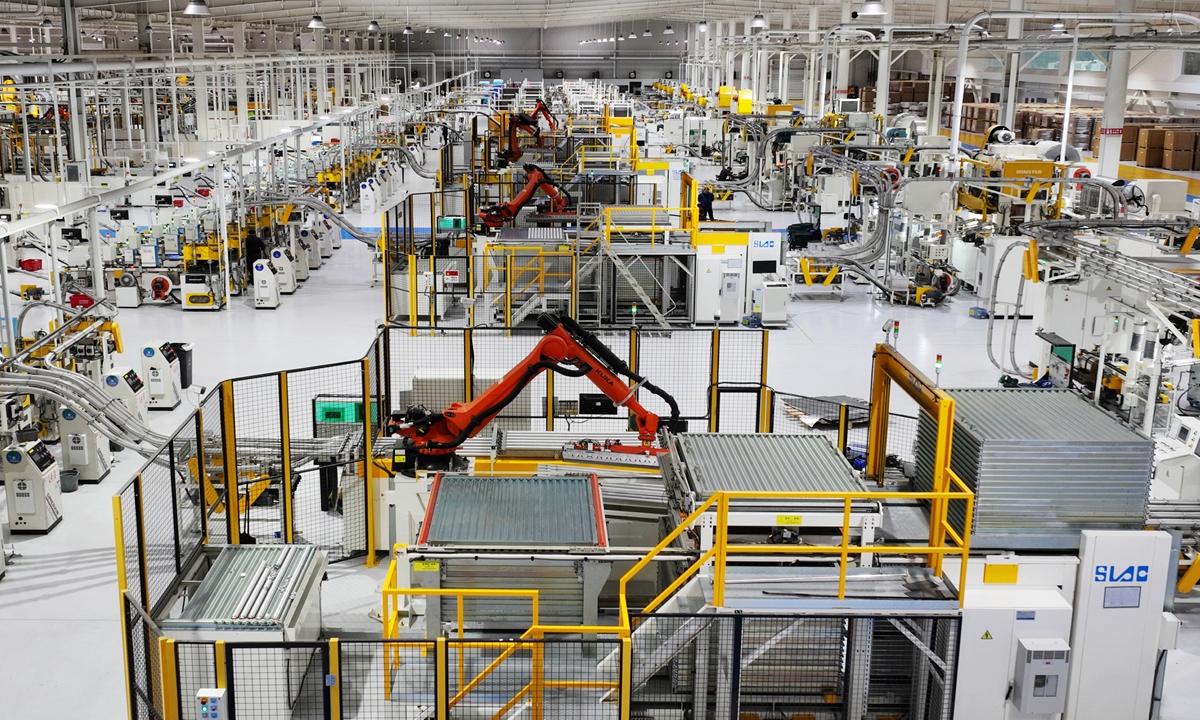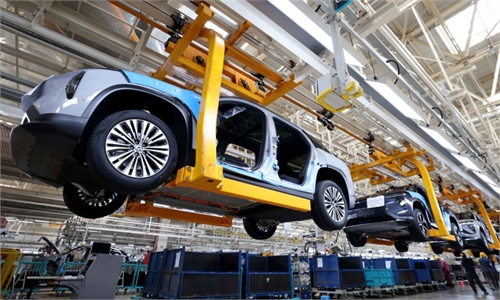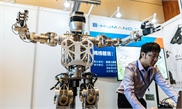China's industrial output expands 7% in Jan-Feb, building on high-tech manufacturing growth
High-tech manufacturing growth speeds up amid industrial upgrading

Industrial robots are operating on an intelligent production line in a smart manufacturing enterprise in Yangzhou, East China's Jiangsu Province. Photo: VCG
China's industrial production growth exceeded expectations in the first two months of 2024, with faster-than-expected expansion seen in high-tech manufacturing, official data showed on Monday.
The figure reflects the robust growth of industrial activities so far this year, and the upward trajectory is expected to continue, boosted by China's pursuit of new quality productive forces and industrial upgrading, experts said.
Value-added industrial output increased by 7 percent year-on-year during the January-February period, according to data from the National Bureau of Statistics (NBS). The growth rate was accelerated by 0.2 percentage points from December 2023.
Among the highlights, high-tech manufacturing saw a 7.5 percent year-on-year increase in industrial output during the first two months - a rise of 1.1 percentage points from December - amid a continued trend of accelerated expansion for a third consecutive month, according to the NBS.
Industrial exports ended an eight-month fall, rising 0.4 percent in the January-February period after a drop of 3.2 percent in December.
The growth of value-added industrial output in January and February exceeded market expectations, with the high-tech industry showing an impressive performance, said Zhou Maohua, a macroeconomist at China Everbright Bank.
The continued rapid growth of the high-tech and equipment manufacturing industries, particularly in sectors such as new-energy vehicles (NEVs) and green energy, reflects the successful structural optimization that is taking place, Zhou told the Global Times on Monday.
According to the NBS, the output of high-tech and low-carbon products experienced significant growth in the first two months. The production of new-energy vehicles saw a notable increase of 25.6 percent, and the production of charging stations rose by 41.8 percent.
Investment in high-end manufacturing, traditional industrial transformation and strategic emerging industries has also accelerated, as China's manufacturing industry is shifting toward quality improvement.
Manufacturing investment grew by 9.4 percent, up 2.9 percentage points from the whole year of 2023. Investment in equipment manufacturing grew by 14.3 percent and high-tech manufacturing by 10.0 percent from a year earlier, outpacing overall growth, according to NBS data.
The manufacturing sector will continue its upward trajectory, boosted by China's pursuit of new quality productive forces. Recently introduced support policies - large-scale equipment renewal and trading-in of consumer goods - are expected to further boost the industrial economy, experts said.
Overseas markets are showing strong demand for Chinese new-energy products, while domestically, there is a growing need for high-tech and equipment manufacturing as China undergoes an industrial transformation and upgrading under the new round of large-scale equipment upgrades and consumer goods replacement, Zhou said.
The State Council, the cabinet, released an action plan to promote large-scale equipment renewals and trade-ins of consumer goods, according to a circular issued on Wednesday.
By 2027, investment in equipment in industry, agriculture, construction, transportation, education, culture and tourism and healthcare should increase by more than 25 percent from 2023. In industrial enterprises above the designated size, the penetration rate of digital research and development and design tools should exceed 90 percent, while the numerical control rate of key processes should surpass 75 percent by 2027.
China will strive to modernize its industrial system and develop new quality productive forces at a faster pace, according to the Government Work Report.
The report lists tasks in this respect, including industry and supply chain improvement and upgrading, and the cultivation of emerging industries and future-oriented industries such as hydrogen power, new materials, biomanufacturing, commercial spaceflight, quantum technology and life sciences. Innovative development of the digital economy will be promoted, with an AI plus initiative to be launched, according to the Xinhua News Agency.
With the support of government policies, investment in manufacturing is expected to remain at a high level, Wu Chaoming, a deputy head of the Chasing Research Institute, told the Global Times on Monday.
High-tech manufacturing is a catalyst for driving high-quality economic development and the establishment of a modern industrial system. It is expected that forthcoming policies will further bolster support for this sector, offering vital assistance for capital investments in related industries, Wu said.



